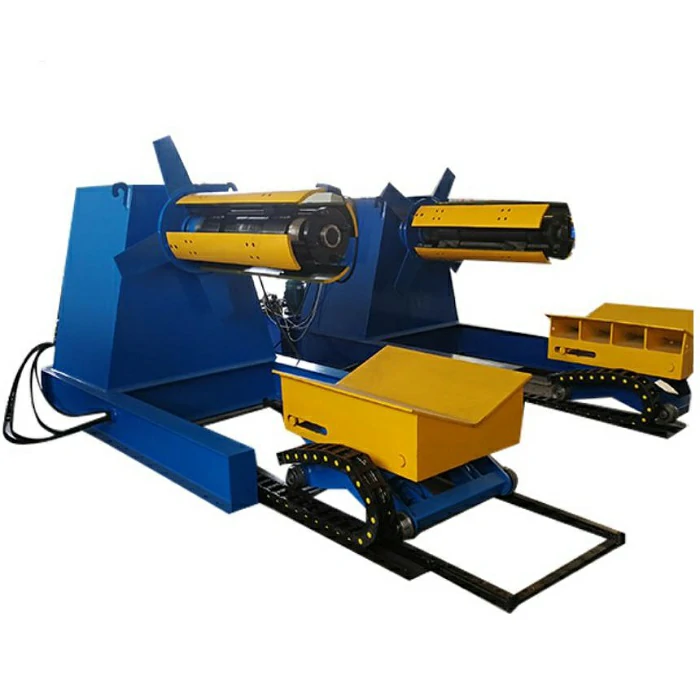decoiler
The Essential Role of Decoilers in Modern Manufacturing
In the fast-paced world of manufacturing, efficiency and precision are paramount. One of the often-overlooked components that contribute significantly to these goals is the decoiler. Decoilers play an essential role in the production process, particularly in industries that deal with metal processing, packaging, and various fabrication tasks. This article will delve into the function, importance, and technological advancements related to decoilers, illustrating why they are integral to modern manufacturing operations.
Understanding Decoilers
A decoiler is a machine designed to unwind coiled metal strips or rolls, making them ready for further processing such as cutting, bending, or forming. The process of decoiling ensures that the material is fed smoothly and continuously into other machinery, reducing the risk of jams or defects. Decoilers can handle various materials, including steel, aluminum, and composites, depending on the specific needs of a manufacturing operation.
The typical operation of a decoiler involves clamping the coil securely, then gradually unraveling it while maintaining tension to ensure a steady feed. This is critical as improper tension can lead to material deformation, increased scrap rates, and inefficient workflow. By providing a reliable and consistent method for material handling, decoilers enhance productivity and maintain the quality of the end products.
Applications Across Industries
Decoilers have diverse applications across several industries. In automotive manufacturing, for example, they are crucial in preparing metal sheets for stamping processes, which shape parts like car doors and chassis. In the construction industry, decoilers facilitate the distribution of steel sheets for structural components and reinforcements, ensuring that materials are readily available when needed.
Additionally, decoilers are integral to the packaging industry. They support the processing of various materials for packaging products ranging from food to electronics. Here, the role of decoilers extends beyond mere unwinding; they often work in conjunction with other systems like conveyors, cutters, and sealers, creating a seamless production line.
Technological Advancements
decoiler

With the advent of new technologies, decoilers have undergone significant evolution. Modern decoilers are equipped with advanced features such as electronic controls, automatic tension adjustments, and integration with digital monitoring systems. These innovations not only enhance the performance of decoilers but also improve operator safety and reduce maintenance needs.
For instance, automated decoilers can adjust tension based on real-time feedback from the material being processed. This automation minimizes the need for manual intervention and significantly reduces the risk of errors. Also, real-time monitoring systems can detect potential issues early, enabling timely maintenance and minimizing downtime.
Moreover, the integration of Industry 4.0 technologies, like IoT and AI, is driving decoilers to become smarter and more efficient. Predictive analytics can be applied to anticipate material needs and optimize processes, while remote monitoring capabilities allow for better oversight, enabling manufacturers to address issues promptly and efficiently.
The Future of Decoilers
As manufacturing continues to evolve, the importance of decoilers will only grow. With trends moving towards customized products, shorter production runs, and increased sustainability efforts, decoilers will need to adapt. The demand for more flexible and versatile decoiling solutions is increasing, pushing manufacturers to innovate continuously.
Furthermore, as industries aim for eco-friendly practices, decoilers using materials that reduce waste and energy consumption will become more common. Recycling processes that incorporate decoilers will also be essential as companies strive for circular economy practices.
Conclusion
Decoilers may often be overlooked in discussions about manufacturing technologies, but their essential role cannot be understated. They ensure efficiency, quality, and productivity across various industries, adapting to meet the challenges of modern manufacturing. As technology advances, so too will the capabilities of decoilers, reinforcing their significance in an ever-evolving industrial landscape. Understanding and investing in these vital components could be the key to achieving operational excellence in any manufacturing endeavor.
-
Roof Panel Machines: Buying Guide, Types, and PricingNewsJul.04, 2025
-
Purlin Machines: Types, Features, and Pricing GuideNewsJul.04, 2025
-
Metal Embossing Machines: Types, Applications, and Buying GuideNewsJul.04, 2025
-
Gutter Machines: Features, Types, and Cost BreakdownNewsJul.04, 2025
-
Cut to Length Line: Overview, Equipment, and Buying GuideNewsJul.04, 2025
-
Auto Stacker: Features, Applications, and Cost BreakdownNewsJul.04, 2025
-
Top Drywall Profile Machine Models for SaleNewsJun.05, 2025








